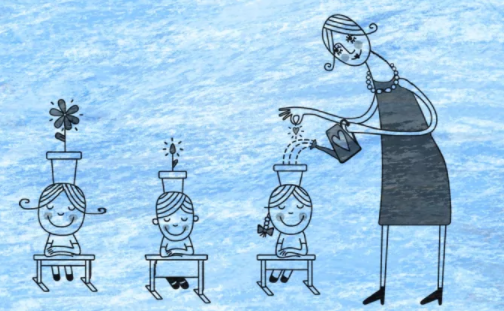(单词翻译:单击)
When you look or looked around your classroom, it's usually pretty easy to identify the so-called "smart kids".
在教室里看一圈,通常很容易识别出所谓的“聪明孩子”。
They're typically the ones who get the best grades, and who often stick their hands up first to answer the question.
他们的成绩拔尖,而且通常第一个举手回答问题。
Depending on how you approach things, thinking of your classmates — or yourself — this way might not be the best idea.
处理事情的方式因人而异,想想你的同学或者自己,上面的方式可能并不是最好的。
Doing well in school is definitely a good thing, and actually being smart is good.
在学校表现好绝对是一件好事,实际上聪明有好处。
General intelligence plays a big role in people's lives, and is related to educational achievement, income, and how long you live.
普通智力在人们的生活中扮演着重要的角色,智力的高低与学术成就、收入和个人阅历有关。
But how you think about your abilities could lead to some problems.
但是对自己能力看法的不同会引发一些问题。
Specifically, if you think you can't change them, or if you worry what other people will think when you mess up.
具体来说,如果你认为自己的能力无法改变,或者在意表现不好时别人的想法。
Lots of scientists have studied intelligence, but many of the ideas about how people think about being smart have come from a researcher named Carol Dweck.
许多科学家都研究过智力,但一位名叫卡罗尔·德维克的人研究过人们对聪明的看法。
Starting around the 1980s, she proposed that kids from preschool to junior high are inclined toward one of two big ideas about their abilities and goals.
20世纪80年代,德维克提出,幼儿园到初中的孩子往往表现为能力和目标类型中的一种。
At one end of the spectrum, they might subscribe to the entity orientation, which is the belief that your abilities are innate and fixed.
一些人可能认同实体导向,即相信能力是天生的,固定的。
In other words, if you're good at something, it's probably because you're a natural at it, not because you worked hard.
换句话说,如果你擅长某件事,可能是因为你天生擅长,而不是因为你后天的努力。
At the other end is the incremental or mastery orientation, which says that, with effort, you can improve your abilities, and learn to do things better.
另一些人支持增量或者掌握导向,也就是说,后天努力能够改变能力,人可以学着把事情做的更好。
These two concepts were supported by Dweck's research, but in the 1990s, she took them one step further.
德维克在其研究中支持了这两个概念,但在20世纪90年代,德维克又做了更进一步的研究。
In 1994, she and another researcher that observed 78 four- and five-year-olds.
1994年,她和另一名研究人员对78名4岁和5岁的儿童展开了研究。
The study found that the kids were already starting to develop consistent preferences for activities.
研究发现,孩子们的偏好开始一致。
For example, they might prefer to do a puzzle they had already done over trying a new one.
例如,他们可能更愿意做他们已经做过的擅长的事情。
It also found that the kids who wanted to keep doing older puzzles were more likely to give negative self-evaluations when completing a more challenging puzzle.
研究还发现,在完成难度更大的挑战时,想要接着从事以前做过事情的孩子更有可能给出负面的自我评价。
They were more likely to make comparisons to others, too.
这些孩子与他人比较的可能性也更大。
Based on this, Dweck proposed that these two orientations —entity and incremental— didn't just exist:
基于此,德维克提出了人们不仅具有实体导向和增量导向:
They also came with their own motivations and goals.
还有自己的动机和目标。
Specifically, people with a incremental orientation were more interested in putting effort toward mastering new skills.
具体来说,增量导向的人对努力掌握新技能更感兴趣。
Meanwhile, those with an entity orientation were motivated more by performance goals, like what others would think of them.
与此同时,绩效目标对于那些实体导向的人更有吸引力,就像他们在意其他人对自己的看法一样。

Thanks to work by other researchers, Dweck figured that these orientations came from what kind of praise kids got growing up.
感谢前人的研究,德韦克认为,孩子成长过程中得到的表扬决定了孩子们属于哪一种导向。
Basically, if you got a lot of praise for being smart, it would lead you toward an entity orientation, and you might get more nervous about screwing up.
基本上来说,如果很多人夸你聪明,那么你就会偏向实体导向,搞砸事情可能会让你更加紧张。
After all, failing might not make you the supposed "smart kid", anymore.
毕竟,失败也许不再让你成为“聪明孩子”。
On the other hand, if you were praised more for the effort you put into things, Dweck said you'd be more interested in putting more effort toward learning new skills.
另一方面,很多人夸你做事情很努力,德韦克表示你会对学习新技能更感兴趣。
And you'd have an incremental orientation.
那么你就属于增量导向。
Over time, these two orientations came to be called a growth and fixed mindset.
随着时间的推移,这两种导向被称为成长和固定的心态。
"Growth" for the idea that you can master new skills through challenging yourself, and "fixed" for the belief that your abilities are stable.
“成长”是指你可以通过挑战自己来掌握新的技能,“固定”是指你的能力是稳定的。
Today, psychologists are pretty confident that these mindsets are a reliable way of thinking about yourself.
如今,心理学家们自信地认为,成长型和固定型心态是看待自己的一种可靠的方式。
But despite what you might see online or in parenting blogs, that doesn't necessarily mean one mindset is better than the other.
但不管你在网上或育儿博客上看到什么,这并不一定意味着一种心态比另一种好。
The truth is, when you look at the research, there's actually mixed evidence about how these ideas play out in real life.
事实是,你看到这个研究,我们在现实生活中都能够找到与之对应的例证。
Some studies do suggest that having a fixed mindset might not be great when it comes to academics.
一些研究表明,涉及到学术知识时,拥有固定的心态可能并不是件好事。
Take a 2007 study of nearly 400 kids in New York Public Schools, for example.
以2007年一项针对纽约公立学校近400名学生的研究为例。
In it, researchers found that seventh graders with a fixed mindset had worse math grades at the start of the study,
在研究中,研究人员发现,研究开始时,心态固定的七年级学生的数学成绩较差。
and that they didn't improve their grades over the next two years.
而且在接下来的两年里他们的成绩没有提高。
Meanwhile, those with a growth mindset started out a little better, and then kept improving.
与此同时,那些成长型心态的人开始的时候稍微好一点,然后持续改善。
Then again, more recent papers have painted a less clear picture about if mindset really matters at all.
然而,最近的一些论文对心态是否真的重要的问题却叙述得不那么清楚。
In a more recent meta-analysis, researchers looked for studies that measured both students' mindsets,
在最近的一项元分析中,研究人员测量了两名学生的心态,
and reported some academic outcome, like standardized tests or GPA.
取得了一些学术成果,比如标准化考试(或GPA)。
They found that, over 129 studies, the two things were related, but pretty weakly.
129项研究发现,这两件事是相关的,但关系不大。
In other words, mindset did make some difference, but there were probably lots of other things more important to kids' grades.
换句话说,心态确实起了一些作用,但对孩子的成绩来说,可能还有很多其他更重要的东西。
This was supported by the fact that some studies trying to change people from a fixed to growth mindset didn't seem to improve academic achievement compare to controls.
一个事实支持这一结论:与对照组相比,一些试图让人们从固定型心态转变为成长型心态的研究似乎并没有提高学术成就。
Admittedly, this could be because the students' mindsets didn't actually change after a few days in the classroom.
诚然,这可能是因为学生们在课堂上呆了几天后,他们的心态并没有真正改变。
But it could also be because your mindset isn't everything.
但也可能是因为心态不能决定一切。
So if you think of yourself as smart, and if people have praised you for that throughout your life, that's okay.
所以,如果你认为自己很聪明,如果人们一直这样称赞你,那没关系。
It doesn't determine your future.
这并不会决定你的未来。
But if you feel like being the smart kid means there's a lot of pressure to get good grades and never make any mistakes,
但是,如果你觉得做一个聪明的孩子意味着你要面临很大的压力去取得好成绩,并且从不犯错,
it's probably also okay to step outside your comfort zone and try some new things.
走出你的舒适区,尝试一些新事物可能也不失为一种好方法。
Everybody fails sometimes, and that's alright.
每个人都有失败的时候,没关系的。
Thanks for watching this episode of SciShow Psych, and special thanks to our patrons on Patreon!
感谢收看本集心理科学秀,特别感谢Patreon对本节目的支持!
We couldn't make SciShow without you and appreciate everything you do.
没有你我们就无法制作出这样的剧集感谢你所做的一切。
If you'd like to help us keep making free, online psychology videos, you can go to patreon.com/scishow.
如果你想帮助我们制作免费的在线心理学视频,可以访问patreon.com/scishow。


